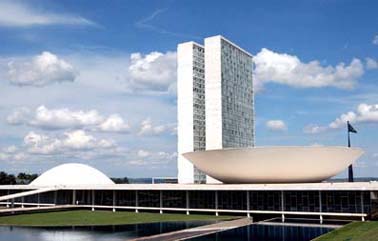 |
Brasilia,
one of the newest cities in the world was designed, constructed and
inaugurated in central Brazil with one specific purpose: Being the
capital of the country. Fifty years ago, the men behind this huge
project had one dream in common. Building the city of the future. A
city for people, with generous open spaces everywhere, where men could
see the horizon, feel the breeze, be part of that environment, and at
the same time would be surrounded by modern and functional
buildings, designed for turning everyday life and activities into
something rational and conveniently agreeable. |
Planned
for a maximum population of 500,000 there would be no traffic jams and
no traffic lights. Brasília was built to be, not only a showcase of
Brazilian architectural art, but also a city for the people. But then…
it started growing up much more rapidly than anyone could expect. Today
there are almost two million people living here, and yes, a lot of
traffic lights and traffic jams. Even so, you can’t say the initial
idea didn’t succeed. As an architectural experience, or a dream of a
futuristic city, this place, head of the Brazilian government, is a
unique one. Definitely Brasilia remains today as one of the most
interesting places in the world, apart from any other. |
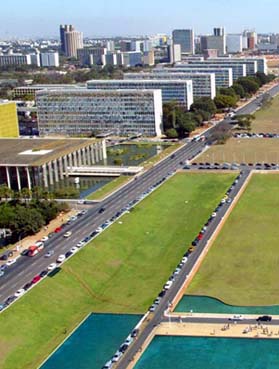 |
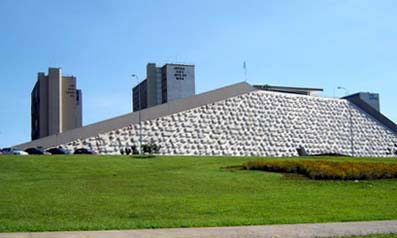
|
All
the government offices are located at Esplanada dos Ministerios, like a
giant set of big glass and concrete dominos. Far way, at the very end
of this same picture, the two towers of Congress can be seen again.
Most of the architectural innovations of town are located in this area,
starting with Palacio do Planalto (Presidential Palace), Palacio da
Justica (Supreme Court) and Palacio do Itamaraty (Foreign Ministry,
with beautiful artificial cascades). For a nice view of the main
buildings in the area, go to Three Powers Square (referring to the
legislative, executive and judicial branches), the place where this
three buildings are, facing each other. |
The
best place in town to get a great view is from the top of the main
Television Tower. There is also a restaurant at the first floor. At the
west side of Esplanada dos Ministerios, visit also the impressive
National Cathedral, built in the shape of a crown with angels suspended
in the interior. If you have more time, visit the National Museum which
has an interesting historical displays and a comprehensive firearms
collection. Unlike many other towns in Brazil, in Brasilia you need a
car for almost everything. Even not being a big city, the distances
here are not for walking. |
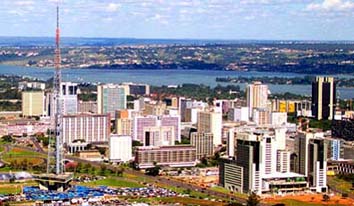 |
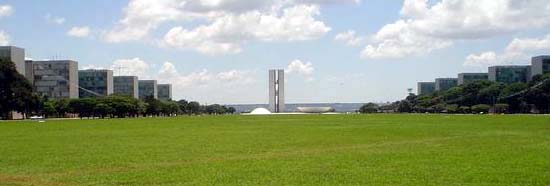
|
A view of Esplanada dos Ministerios, with the Capitol Building at the center.
|
The
first photo on this page shows Palacio do Congresso (Capitol Building).
Its shape flanked by two bowls, one facing up and one facing down is,
at the same time beautiful and abstract, and soon became the most
recognizable icon in town. Actually those bowls are the upper parts of
the National Senate and Chamber of Deputies halls. The center tall
buildings among them houses some offices. At right the Central Bus
Station, and behind it, reminding maybe a pyramid, the National Opera
House. At right, JK Bridge, named according president Juscelino
Kubitschek |
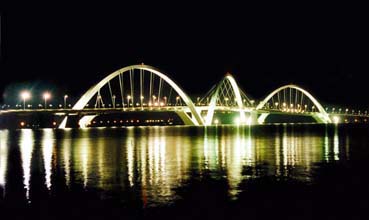 |
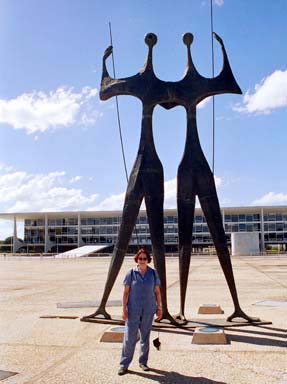 |
The
sculpture at left honors the Candangos, those who worked so hard for
many years during the construction of the city. Behind it, the
Presidential Palace. The important buildings in Brasilia were all
designed by world wide famous Brazilian architect Oscar Niemeyer whose
pure geometry and futuristic forms and shapes can be found everywhere
in Town. Working together with designers Roberto Burle Marx, and Lucio
Costa they achieved a collection of buildings that has rightly been
called the highest expression of architectural Modernism on earth.
A
traditional shopping, Conjunto Nacional was the first mall in Brasilia.
It is located downtown, right across Nacional Theatre, and Brasilia
Central Bus Station. Alternative good shopping areas are Park Shopping,
Patio Brasil and Liberty Mall. |
Brasilia's
most important leisure space is Parque da Cidade, with grass fields
intersected by jogging and cycle paths, but, due to the very hot and
dry weather during most part of the year, walking is not one of the
preferred Brasilienses (those who were born or live here) hobbies.
Instead, on leisure time, they prefer to go shopping, or to some of the
many bars and cafes in town. For shopping, the main areas are just past
the North Hotel Sector, at Brasilia Shopping, where you will find a
large number of movie theaters, trendy clothing boutiques, an excellent
food court with a number of good and inexpensive restaurants. |
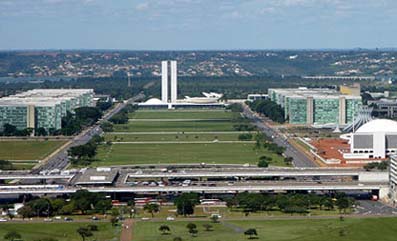 |
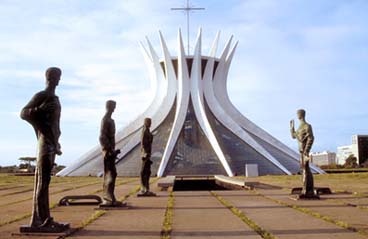 |
At
left, the City Cathedral. For a relaxing drink at the end of a day try
Pier 21 or Pontao do Lago Sul. Both areas have a large number of
restaurants, cafes and nightclubs. Outside the city you will find many
attractions. Brasilia is located right in the heart of Cerrados, a
place in Brazil famous for its unique wild landscape. A tour in this
area must include a visit to Chapada dos Veadeiros National Park,
located at the north of Goias State. |
Yes,
this is that traditional photo every tourist in Brasiilia must take,
with the Capitol building just behind. On sundays you will find there a
one hour tourist tour inside the Capital, which is very
interesting. |
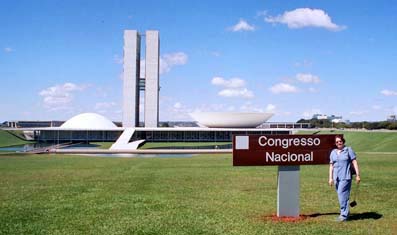
|
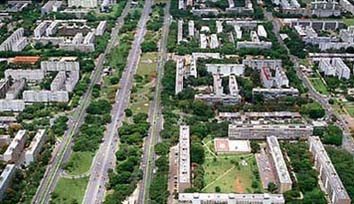 |
Aerial
view from a Superquadra, one of the residential areas. As you will
notice, Brasilia has no mountains, no sea and no forest. When you think
about Brazil, this may sound quite unusual, and it really is indeed. So
you might ask why was this place chosen to receive the new capital? The
answer is that is was considered a main issue at that time transfer the
government to the interior of the country, as a way of conquering this
lands, and helping the west development. At that time many people
considered this a crazy idea, and strongly disagreed with it. Even
today, many Cariocas (those who are born or live in Rio) still joke
about this town saying that the best think to do in Brasilia is getting
a plane to Rio... Anyway we have to agree that those crazy dreams were
not only dreams, and the main goal of the people who decided for its
construction really succeeded. |
|
Brasilia
was inaugurated on April 20, 1960. This photo was taken at JK Memorial,
honoring president Juscelino Kubitschek, former president of Brasil who
decided to construct Brasilia and move the city capital from Rio de
Janeiro. The memorial also houses a museum, where many items related to
JK life and the construction of Brasilia are kept. Also worth visiting
in Brasilia is Dom Bosco Sanctuary, where centuries ago, a priest
called Bosco had a vision about a futuristic city being built in the
heartland of Brasil. Visit also Our Lady of Fatima small and lovely
church, Alvorada Palace (official home of the President of Brasil),
Catetinho (former residence of the president before the conclusion of
Alvorada Palace), National Theatre, ), Brasilia Botanical Garden and
City Zoo, this last one interesting specially for children. |
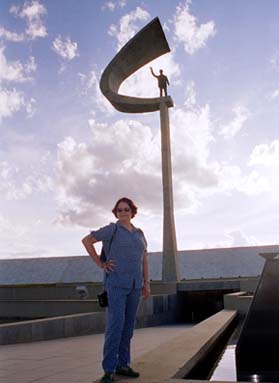 |
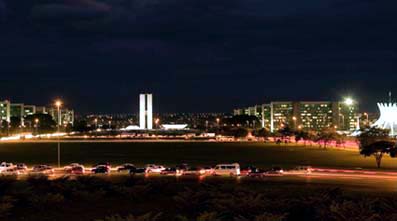 |
The
best time to visit Brasilia is around april to june, when most of the
day are clear and not too much dry. If you plan to visit the city for
some days only, and want to really feel its beating heart, try to avoid
Saturdays and Sundays. As home of Brazil government, most of the people
working here are related one way or another to the government offices
and many of them leave town on weekends, so the city gets somewhat
empty. The city is just 90 minutes flight from Rio, and is connected
with daily flights to every point in the country. A visit to Brasilia
will be specially interesting for those who love architectural arts and
urbanism, for, in this issue, Brasilia is surely second to none. |
Vídeo: Taking off from Brasilia

|
|